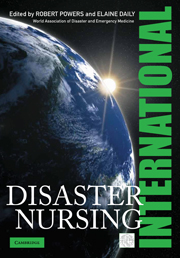Book contents
- Frontmatter
- FOREWORD I
- FOREWORD II
- Contents
- CONTRIBUTORS
- PREFACE
- ACKNOWLEDGMENTS
- CHAPTER 1 INTRODUCTION TO DISASTERS AND DISASTER NURSING
- CHAPTER 2 HEALTHCARE FACILITY PREPAREDNESS
- CHAPTER 3 COMMUNITY BEHAVIOR AND RESPONSE TO DISASTER
- CHAPTER 4 FIRST RESPONDERS
- CHAPTER 5 DISASTER TRIAGE
- CHAPTER 6 HOSPITAL IMPACT: EMERGENCY DEPARTMENT
- CHAPTER 7 HOSPITAL IMPACT: IMMEDIATE ISSUES
- CHAPTER 8 HOSPITAL IMPACT: LONG-TERM ISSUES
- CHAPTER 9 HOSPITAL IMPACT: INTERNAL DISASTERS
- CHAPTER 10 HEALTHCARE FACILITIES INCIDENT COMMAND
- CHAPTER 11 CHEMICAL PREPAREDNESS AND RESPONSE
- CHAPTER 12 BIOLOGICAL PREPAREDNESS AND RESPONSE
- CHAPTER 13 EMERGENCY MANAGEMENT OF RADIATION INJURIES AND ILLNESSES
- CHAPTER 14 EXPLOSIVE EVENT PREPAREDNESS/RESPONSE
- CHAPTER 15 DECONTAMINATION
- CHAPTER 16 POPULATIONS WITH VULNERABILITIES AND SPECIAL NEEDS
- CHAPTER 17 DISASTERS AND CHILDREN
- CHAPTER 18 REGIONAL PLANNING
- CHAPTER 19 US FEDERAL RESOURCES AND RESPONSE
- CHAPTER 20 INTERNATIONAL DISASTER RESPONSE
- CHAPTER 21 DISASTER NURSING RESPONSES IN JAPAN
- CHAPTER 22 PREPAREDNESS OF THE ISRAELI HEALTH SYSTEM FOR EMERGENCIES
- CHAPTER 23 PUBLIC HEALTH RESPONSE
- CHAPTER 24 PANDEMIC PLANNING
- CHAPTER 25 HEALTH ISSUES IN HUMANITARIAN EMERGENCIES
- CHAPTER 26 DISASTER MENTAL HEALTH
- CHAPTER 27 DISASTER ETHICS
- CHAPTER 28 DISASTER RECOVERY
- CHAPTER 29 THE SOUTHEAST ASIA TSUNAMI: HEALTH ASPECTS
- CHAPTER 30 HURRICANE KATRINA: HEALTH ASPECTS
- CHAPTER 31 DISASTER NURSING EDUCATIONAL COMPETENCIES
- CHAPTER 32 DISASTER NURSING RESEARCH
- CHAPTER 33 DISASTER RESEARCH FRAMEWORK
- INDEX
PREFACE
Published online by Cambridge University Press: 02 December 2010
- Frontmatter
- FOREWORD I
- FOREWORD II
- Contents
- CONTRIBUTORS
- PREFACE
- ACKNOWLEDGMENTS
- CHAPTER 1 INTRODUCTION TO DISASTERS AND DISASTER NURSING
- CHAPTER 2 HEALTHCARE FACILITY PREPAREDNESS
- CHAPTER 3 COMMUNITY BEHAVIOR AND RESPONSE TO DISASTER
- CHAPTER 4 FIRST RESPONDERS
- CHAPTER 5 DISASTER TRIAGE
- CHAPTER 6 HOSPITAL IMPACT: EMERGENCY DEPARTMENT
- CHAPTER 7 HOSPITAL IMPACT: IMMEDIATE ISSUES
- CHAPTER 8 HOSPITAL IMPACT: LONG-TERM ISSUES
- CHAPTER 9 HOSPITAL IMPACT: INTERNAL DISASTERS
- CHAPTER 10 HEALTHCARE FACILITIES INCIDENT COMMAND
- CHAPTER 11 CHEMICAL PREPAREDNESS AND RESPONSE
- CHAPTER 12 BIOLOGICAL PREPAREDNESS AND RESPONSE
- CHAPTER 13 EMERGENCY MANAGEMENT OF RADIATION INJURIES AND ILLNESSES
- CHAPTER 14 EXPLOSIVE EVENT PREPAREDNESS/RESPONSE
- CHAPTER 15 DECONTAMINATION
- CHAPTER 16 POPULATIONS WITH VULNERABILITIES AND SPECIAL NEEDS
- CHAPTER 17 DISASTERS AND CHILDREN
- CHAPTER 18 REGIONAL PLANNING
- CHAPTER 19 US FEDERAL RESOURCES AND RESPONSE
- CHAPTER 20 INTERNATIONAL DISASTER RESPONSE
- CHAPTER 21 DISASTER NURSING RESPONSES IN JAPAN
- CHAPTER 22 PREPAREDNESS OF THE ISRAELI HEALTH SYSTEM FOR EMERGENCIES
- CHAPTER 23 PUBLIC HEALTH RESPONSE
- CHAPTER 24 PANDEMIC PLANNING
- CHAPTER 25 HEALTH ISSUES IN HUMANITARIAN EMERGENCIES
- CHAPTER 26 DISASTER MENTAL HEALTH
- CHAPTER 27 DISASTER ETHICS
- CHAPTER 28 DISASTER RECOVERY
- CHAPTER 29 THE SOUTHEAST ASIA TSUNAMI: HEALTH ASPECTS
- CHAPTER 30 HURRICANE KATRINA: HEALTH ASPECTS
- CHAPTER 31 DISASTER NURSING EDUCATIONAL COMPETENCIES
- CHAPTER 32 DISASTER NURSING RESEARCH
- CHAPTER 33 DISASTER RESEARCH FRAMEWORK
- INDEX
Summary
ALL ASPECTS OF HEALTH CARE, and all health disciplines may become involved, at some level, in the health response(s) to and recovery from a disaster. Specialized education is fundamental in preparing nurses for their evolving and expanding roles during crises and disasters. The 2007 report from the World Health Organization's Consultation on Nursing and Midwifery in Emergencies called for improved skills and competencies of nurses involved in emergencies and disasters, and for disaster nursing education to be integral in both pre-service and in-service nursing education.
Knowledge is key to disaster preparedness and effective responses. The intent of this text is to provide nurses with an in-depth, comprehensive understanding of their potential role(s) during a disaster, the issues that they may face, how the various response systems and agencies function, and the impact of these disaster response systems on the role(s) and functions of the nurse.
To this end, we have sought input from numerous experts in various fields and disciplines in disaster health. In recognition of the fact that roles and functions often blend and cross over during a disaster, we have selected authors from the disciplines commonly involved in disaster health (such as nursing, medicine, and public health) as well as governmental and non-governmental agencies. As the discipline of disaster health is fairly nascent and without a strong, evidential base, it is essential that we make every effort to share information among the involved professions and to learn from each other.
- Type
- Chapter
- Information
- International Disaster Nursing , pp. xxi - xxiiPublisher: Cambridge University PressPrint publication year: 2010



